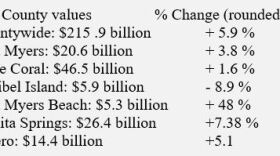STEVE INSKEEP, HOST:
The Blackfoot River in western Montana has always been good for fishing trout - rainbow, cutthroat, brown. Norman Maclean's novel "A River Runs Through It" immortalized the place. But this year, the Blackfoot is the lowest it's been in three decades. It's one of many depleted Western rivers, which raises ethical questions for people who love the sport. NPR's Nathan Rott reports.
NATHAN ROTT, BYLINE: Kynslee Scott is a fly fishing guide and conservationist.
KYNSLEE SCOTT: My life revolves around fishing.
ROTT: She's on the banks of the Blackfoot River on an overcast morning, just downstream of a wide riffle, a great spot to fish. But...
SCOTT: For me, unless I have to do it for my job, I don't feel good about coming out and targeting already stressed fish, personally.
ROTT: It's a decision she's come to over the last few years. As summers have grown hotter, rivers more crowded with a boon in anglers after the COVID-19 pandemic.
SCOTT: You know, I don't feel the guide guilt, as I like to refer to it as, early season when water temps are great. But as the year progresses, it just becomes more and more of a burden.
ROTT: For the native trout prized by anglers and critical to the health of rivers across the American West, times are tough. Trout are cold water-adapted species.
CLINT MUHLFELD: They require these cold, connected, complex and clean habitats.
ROTT: Clint Muhlfeld is a research ecologist at the U.S. Geological Survey.
MUHLFELD: The Northern Rockies is actually warming at two times the rate of the global average. And that's really changing the hydrology of our systems, and consequently, the water that the fish live in.
ROTT: Snowpacks are smaller. Spring runoff is earlier. So by late summer, there's less water flowing downstream.
MUHLFELD: And that, in turn, is increasing water temperatures in the rivers.
ROTT: In 2019, Muhlfeld took part in the first global assessment of cold water fish species - trout and char - and found that three-quarters of the species assessed by the International Union for Conservation of Nature are threatened with extinction because of a litany of human actions.
MUHLFELD: Invasive species, overfishing, pollution, dams, deforestation, agriculture, grazing and mining. And now climate change.
ROTT: But he says his research has also found that trout are remarkably resilient. They'll move to better waters when they're able, which is where conservation efforts...
UNIDENTIFIED PERSON #1: Five seconds.
ROTT: ...Like the bombastic kind you're about to hear, come in.
UNIDENTIFIED PERSON #2: Whoa.
(SOUNDBITE OF EXPLOSION)
UNIDENTIFIED PERSON #3: Whoa.
UNIDENTIFIED PERSON #4: Woo-hoo.
ROTT: On Rattlesnake Creek, just north of Missoula, a coalition has been working to restore the waterway by, in part, getting rid of old, unneeded dams. That explosion was from a recent video shared by the group leading the effort, Trout Unlimited, whose employees include Warren Colyer and Christine Brissette. We've met at another removed dam site down the creek.
WARREN COLYER: So this was the big dam that basically cut off all the access up into Rattlesnake Creek from the Clark Fork.
ROTT: The Clark Fork River, which the Blackfoot merges with just outside of Missoula.
CHRISTINE BRISSETTE: The fish that we catch down in the Clark Fork River, the Bitterroot River, wherever we spend our time recreating, spend a portion of their life in these smaller streams.
ROTT: To feed, to spawn and to escape from floods, wildfires or warmer waters. The problem, Colyer says, is that every road culvert, irrigation ditch, dam can impede their ability to move.
COLYER: A lot of the things that we've done over the past 200 years have created stressors for fish and critters that are making it harder for them to cope with climate change.
ROTT: So Trout Unlimited and other conservation groups are trying to help - making artificial beaver dams, slowing runoff, using dams to cool waters downstream, moving fish, in some cases, to new environments. In Montana and some other Western states, what are known as hoot owl regulations close waters to anglers during the hottest part of the day, forcing guides like John Herzer to hit the water early.
JOHN HERZER: They've got a net and two rods. Three rods. God, they are ready to catch fish. (Laughter) You need a bigger net.
ROTT: Herzer is readying his raft for a day on the Blackfoot, heckling a pair of anglers walking to its rocky shore. But he's not planning on doing much fishing himself with his client. He's now offering paddling schools in August to take pressure off the fish, an adaptation that he hopes will help. I ask if he thinks it will.
HERZER: The changes are so drastic. I don't know, you know? I don't know. I hope so.
ROTT: So the trout are there for his kids, he says, and for the generations to come.
Nathan Rott, NPR News, Missoula, Mont. Transcript provided by NPR, Copyright NPR.
NPR transcripts are created on a rush deadline by an NPR contractor. This text may not be in its final form and may be updated or revised in the future. Accuracy and availability may vary. The authoritative record of NPR’s programming is the audio record.








